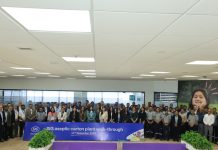JERA Co., Inc. (JERA) and Toyota Motor Corporation (Toyota) announce the construction and launch of the world’s first (as of writing, according to Toyota’s investigations) large-capacity Sweep Energy Storage System. The system was built using batteries reclaimed from electrified vehicles (HEV, PHEV, BEV, FCEV) and is connected to the consumer electrical power grid. It begins operation today.
In the future, demand for storage batteries is expected to grow as they become necessary supply-stabilizing tools when expanding renewable energy in the movement toward CO2 emissions reduction, a vital part of achieving carbon neutrality. At the same time, limited supplies of battery materials including cobalt and lithium, mean there is an ongoing need for environmentally conscious initiatives, such as reclaiming used electrified vehicle batteries for effective use as storage batteries. In response, JERA and Toyota began discussions in 2018 to establish battery reuse technologies, which eventually led to this large-capacity, grid-connected Sweep Energy Storage System.
Toyota’s new storage system is equipped with a function called sweep, which allows the use of reclaimed vehicle batteries, which have significant differences in performance and capacity, to their full capacity regardless of their level of deterioration. The sweep function, developed by Toyota Central R&D Labs, Inc., is a device that can freely control energy discharge by switching electricity flow on and off (bypassing) through series-connected batteries in microseconds.
Furthermore, the sweep function also enables direct AC output from the batteries, while reusing onboard inverters eliminate the need for a power conditioner (PCS). That contributes to reducing costs and helps avoid power loss when converting from AC to DC by PCS, with the aim of improving effective energy use.
The project plans to operate grid storage batteries for recharge and discharge operations, connected to the Chubu Electric Power Grid Co., Inc. power distribution system from a facility (see below(1)) at JERA’s Yokkaichi Thermal Power Station. JERA and Toyota aim to introduce approximately 100,000 kWh of supplied electricity in the mid-2020s, thereby not only reducing the overall cost of the energy storage system, but also contributing to reduction of CO2 emissions.
(1) Selected by Japan’s Ministry of the Environment to conduct an “FY2022 Project for Early Social Implementation of a Decarbonized Metal Recycling System.”
In addition, JERA is developing a low environmental impact process for recycling lithium-ion batteries for electrified vehicles(2), which Toyota plans to support by leveraging the expertise and knowledge it has accumulated through its battery recycling initiatives to date. By collecting used batteries and reusing resources, both companies hope to accelerate their efforts toward achieving a resource-recycling society.
(2) JERA and Sumitomo Chemical Start a Demonstration Project to Develop a Low Environmental Impact Recycling Process for Electric Vehicle Lithium-ion Batteries (JERA Press Release, April 19, 2022)
JERA will continue to work proactively not only within the energy industry but also with leading companies in Japan and overseas to develop technologies such as battery storage systems and services that contribute to optimal energy utilization toward achieving a decarbonized and resource-recycling society.
Toyota actively promotes electrified vehicle adoption and pursues effective battery use, including electrified vehicle battery reuse, for the development of social infrastructure that will support the widespread adoption of electrified vehicles, expand the use of renewable energy, and promote resource recycling toward achieving carbon neutrality.
Copyright ©2022 JCN Newswire. All rights reserved. A division of Japan Corporate News Network.





